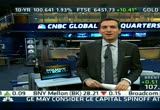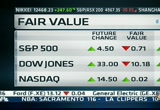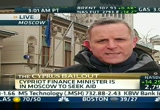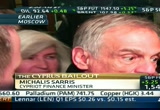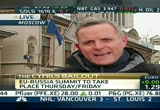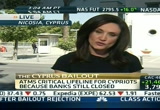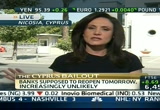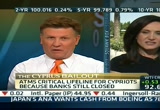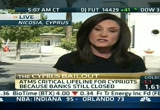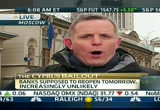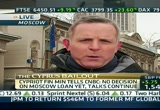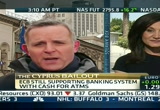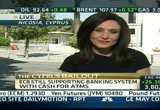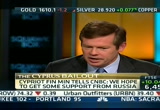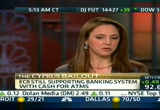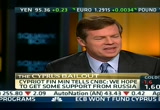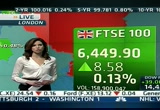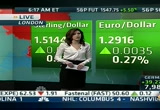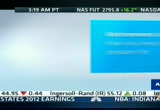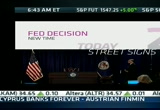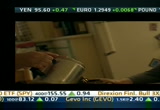tv Squawk Box CNBC March 20, 2013 6:00am-9:00am EDT
6:01 am
good good morning. today's top story cyprus on the brink. the country's bailout now in question and it's turning to russia perhaps for help. in the u.s., the fed is in focus. the central bank is set to finish a two-day meeting. it's wednesday, march 20th. i think it's 7:00 a.m. it becomes springtime. it's 2013. "squawk box" begins right now. good morning. welcome to "squawk box" here on cnbc. i'm andrew ross sorkin along with joe kernen.
6:02 am
becky is off today. she will be back tomorrow. our guest host this hour, david kelly from jpmorgan funds and constance hunter. before we get to them, let's get you caught up on this morning's headlines and we have a lot of them. the big one. fmoc will gather in washington for a second day today. the fed widely expected to maintain its pledge to keep borrowing costs at a record low. the two-day meeting will be concluded with a policy statement updated economic forecast and we'll get a news conference by chairman bernanke. stay tuned to cnbc for complete coverage throughout the day. from the economy to earnings now. we get a number of interesting quarterly reports due today as well. before the bell, we'll hear from fedex, general mills and lennar and this afternoon we have oracle. a lot to chew on for the markets. s&p by the way coming off its first three-day decline of 2013. take a look at u.s. equity futures at this hour. green arrows across the board.
6:03 am
and then of course there's cyprus. the country's leaders are holding crisis talks today trying it avert a financial meltdown. the parliament rejected an unprecedented tax on bank deposits. that was a key part of the eu bailout terms. the finance minister is in moscow today with mounting speculation that russia could step in with a safety plan to safeguard russian deposits in cyprus. steve sedgwick is in moscow where he caught up with the finance minister there an hour or so ago. steve? >> they turned to russians once again. there's a loan on the table from russians dating back from 2011 so it's not the exception to it the rule for the cypriots to turn to the russians. the russians themselves are
6:04 am
indignant they weren't brought into talks. let's hear what he had to say earlier on about the state of the current talks. >> first meeting very constructive. very honest discussion. we underscored how difficult the situation is and we'll now continue our discussions to find a solution by which we hope we will get some support from russia. >> in terms of that support, are we talking about a change of terms for the current existing 2.5 billion euro loan and an extension of 5 billion loan in addition to that? >> we are talking about things beyond that. >> in what way would this be beyond that? >> we don't know. we don't know yet. we don't have any details. we just continue the discussions and they're waiting for us now to continue the discussions in another place. >> how long will the discussions
6:05 am
last for? >> for as long as it takes. we will be here until we get some agreement. >> long as it takes. that's very different of course from the deadline talks we had with the eu. why is it so important for russians? the russians have their biggest investor from what country in the world? cyprus. $130 billion from mostly russian companies based in cyprus went back into russia in 2011. moody's pointed out if there's a moratorium on debt repayment with the cyprus more generally, $53 billion could be on the line for the russians. the russians are big stake holders in this and they are indignant they weren't brought into the discussion before now. for more on the ground in cyprus, let's go out to
6:06 am
michelle. >> hey there, steve. i'll show everybody a headline from one of the local newspapers here if you don't read greek it says russia roulette. in the meantime, the situation here is extremely critical for the banking system. every day that goes by without some kind of plan is one step closer to potential financial collapse of the entire country. the european central bank is still supporting the financial system here with hard cash. it's being delivered to atm machines. that's crucial because it is a lifeline for the people here because the banks are still closed. they've been closed all week. people have been telling us that in fact when they go to stores and such, they're now being told that the vendor or owner of the shop doesn't want a credit card or debit card, they want cash. with banks closed, the businesses can no longer access working capital so they are hoarding cash. you see constant stream of people at the atms. the banks are likely to remain
6:07 am
closed through the weekend if they don't come up with a plan. they were supposed to reopen tomorrow. that would be suicidal if there isn't something in place. now, there's a holiday here on monday. that would give the government five more days to either get money out of russia or come up with some other way to solve the math here. remember when the end game is. this country asked for 17 billion euros from other european countries and they said we're not going to give you that much. we'll only give you 10 billion euros. we'll help you out with recapitalizing the banks but you guys have to come up with nearly 6 billion on your own and really the only place to get it is in deposits. we saw the parliament reject that last night. here's the one piece of insight that i can give you since being on the ground here. overseas everyone was aghast that would try to tax insured deposits. the vast majority of the cypriots we talk to are aghast at the concept of taxing any deposits even the wealthy. they see it as an attack on the
6:08 am
business model of the country. and they don't want that to happen. where do you come up with the money is the question? guys, back to you. >> so many different angles as we go on. they'll take an american credit card. you're using credit cards at your five-star hotel, right, michelle? >> i think it's only a four star. it's a hilton. >> i'm surprised you found one. that's in your contract. >> did you bring a lot of dollar bills with you? >> euros. >> i think at this point they want dollars. >> any cash. >> michelle, thinking back on this and looking at -- i mean, rarely do you get everyone to agree on anything. just about every person in the world looked at the way this was done and said i just can't believe that they would try this. immediately almost when they saw it. do you know who was actually in
6:09 am
the room that night when they -- who was the first guy that said, i have an idea. how about the deposit. i want to interview that person and just see what they were thinking. >> okay. so when you are talking about taxing deposits, you mean the insured or the uninsured? >> that came up with that plan at the last minute. >> okay. >> uninsured came from imf, right? >> well, look, actually no. the idea of taxing uninsured deposits has been on the table for a long time for the imf. they have a goal that they get closer and closer to the point where when a bank bailout needs to happen, all the private sector creditors pay first before the taxpayer. step by step they are getting there. and so they are at the step where they think that if you were an uninsured depositor and you held your money in a bank you knew was insolvent for six
6:10 am
months, you should contribute to recapitalizing that bank. who came up with the idea of taxing the insured deposits? that's a matter of debate. looks like a guy at the icb. ultimately everyone went along with it because the president of this country is still dead set against going to double digits on the huge, large accounts here. and then it becomes simple math. get to 6 billion. you tax high end at 9.9 and tax low end at something. >> go ahead, steve. >> isn't there another point here. by doing this to any depositor and a lot of those deposits could move money like that one when banks are open again. they credated a problem where i could be 26 or 36 billion euros that are needed now. now of that 40% are international investors and a vast amount of them are russian
6:11 am
citizens by saying it's open season on depositors surely we're not talking about $6 billion or 6 billion euros needed now because when those banks are open they won't keep money there and they'll put the money elsewhere. >> if there's a deal to be had with russia, you would think that then russians would keep the money in the banks or no? >> well, not necessarily. i mean, the flows of money are quite extraordinary. let me give you a fact from 2011. $120 billion went from russia into russian based assets in cyprus in 2011. $130 billion went the other way back into russia in the meantime. if we have a situation in cyprus where in order to get the original 10 billion euros from the european union and imf, they have to up corporation tax rates here, what do you think russians looking for low tax jurisdiction are going to do? they're going to move their
6:12 am
money away, aren't they? >> you describe a situation that actually probably can't physically happen. the minute the demands on the banks rise that high, do you know what happens? they collapse and they shut down and the russians don't get that money. the banks collapse. so the minute there's the intention and desire and those wire transfers come in for orders, it's done. they shut it down. they're not getting anything. that's the psychological game. you tell them you withdrawal that money, you're not going to get any of it. >> okay. all right. >> at some point people have to take responsibility for investing in a bank. >> 7%. 7% total corporate assets from russia are based in cyprus. that money if it's lost for cyprus and it's lost for russia, what does that mean for contagion worldwide? i think this is quite stunning what europeans have done. they opened up pandora's box, haven't they?
6:13 am
>> before we leave both of you -- >> i think what they have done is open up the idea that people have to think harder about where they put their money. >> michelle, quickly. walk us through for half a second what happens next. i don't think -- or set the table. either way. another cliche that i like to use. i apologize. just so i understand what could happen in the next 24 to 48 hours both where you are and in russia. >> okay. so they pray for some kind of miracle out of russia and at the same time plan c is that they meet with the president just this morning and also with the head of the central bank to come up with maybe some kind of restructuring for the banking system. maybe you move much more quickly to resolve that bureaucrat code for collapsing the two big banks and you get closer to coming up with money you need in order to get the bailout money. >> all right. we're going to get to our guest hosts. thanks, michelle and steve. i would have asked you guys this but we got to get to our guest
6:14 am
hosts. i don't know if you have an opinion on it. greece seems like we gave them a lot of money without ever asking them to do the deposit thing. a lot more. what changed? is it that germans got so fed up? >> to me it's simple. >> we gave greece more money. >> politicians in europe don't understand the first thing about macro economics. if you have a banking crisis which you just patched together at enormous cost the idea of doing something like this that causes people to doubt whether money is safe in the bank is ludicrous. >> that's what i was getting to earlier. who was in the room that night going i have an idea. why don't we do -- >> the problem is we have a surplus of politics and deficit of intelligence when it comes to this. germans and fins and a number of others feel they have to tell very uninformed electorate that they are being tough. we have to extract some blood.
6:15 am
they don't understand that this is a two pointed sword. by trying to extract blood from greeks sand cypriots they are inflicting enormous pain. $500 billion worth of capitalization around the world wiped out. >> as moronic as this plan was, we've heard there are not a lot of options. >> there are options. >> first of all, they should be putting in place the equivalent of the fdic. when we close a failed bank in the united states, we go in on a friday with fdic and occ. it's all hush hush. you close the bank. you move the depositors money into a good bank and you don't lose faith in the banking system. >> don't they need 27 countries to put that in their charter? >> this is what europe was moving toward. this is what was recognized this past summer and this is why --
6:16 am
>> we knew it would take time. >> this throws that out the window and the thing is that they're not saying they're not guaranteeing -- the way they are backing around it is this is a tax but we're still guaranteeing the deposits that we're guaranteeing. it's a problem. in the room were two germans that were for this because germany has elections in september and they did not want -- there was a scapegoat. it was russia. >> there was another way out of this. cyprus has offshore energy reserves which you will be able to exploit. that's an asset. >> that's what russia is -- what i understand is happening in negotiations is that's what they're asking for. they want access to that. >> come up with a deal quietly. that is the essence of no matter what esb does it's impossible to
6:17 am
get europe growing economically because we make decisions that don't make sense. >> did you see how -- where was sedgwick? was he is russia? we had them arguing. we can do cool stuff. satellite stuff. there was some overlap. it's not easy to do that. now we'll go to kelly evans who i never talk to about whether you went to paris. i don't want to digress. you were thinking about that. did you take the plunge? >> joe, i go this weekend. yes. i'll report back monday and let you know what i think. i haven't been. i'll let you know. in the meantime, i just want to go back to the point about who was in the room thinking this would be a good idea to tax deposits in cyprus. it's actually the cypriots themselves here. they have a $2.5 billion loan already with the russians. they are the ones who want to
6:18 am
make sure the international community didn't come after russian depositors. they didn't want a double digit deposit rate because it would look bad. if you did the 30% or 40% tax on those higher earning accounts, that's putting it all on the russians who they rely on for this aid. what do we see this morning? they are going back to russia for more aid. that's why even though this would seem to make no sense for smaller depositors, they are trying to balance the interest between those smaller accounts in cyprus and need for funds from russia to try to solve this problem entirely. looks like it's not going to happen this morning. markets don't seem to care. spain and italy are rallying. i can't tell you how many people the last couple days are saying cyprus is a unique issue to the extent spa spaniards and italians don't pull money out of banks, it's hard to trace the
6:19 am
concerns that the moves raise. if you want to gauge whether things will unravel here. keep an eye on this. earlier in the week we have seen attention called to underperformance of base metals but today a rally. brent and nymex are rallying. important day in britain because the government will unveil its budget. the question is how much they might swing away from austerity toward something more stimulative. we had strong employment data and a sense that bank of england wasn't going to be objecting accommodative. sterling up to 1.51. we'll host a budget special here for european and london viewers in a couple hours time. euro/dollar up to 129.18. a fluid situation. one that raises plenty of concerns. one that the market is taking today in stride. back over to you. >> thanks.
6:20 am
you should just watch the first three minutes of midnight in paris. >> i've seen it. >> watch the first three minutes again. >> a couple times. i think i'm fully prepared. >> it's all there. woody did a great movie with rome too. he's getting nostalgic. home builders. you get excited. they're coming back. >> coming up, home builder posting better than expected results this morning. we'll give you the full story after the break and joe mentioned today is the first day of spring. that means the official start of the national cherry blossom festival in d.c. are you going down there? it's a celebration of the original gift of 3,000 cherry trees from the city of tokyo to the people of washington in 1912. what a nice neighborly gesture. the peak bloom period is
6:23 am
6:24 am
747. >> do you see that smaller plane on the left. that's one of ours or one of theirs? >> it has the same colors. i don't know. did i see stars and stripes on it. there's probably enough people going with him they need -- 747 -- i don't know. >> there are a lot of people. look at equity futures at this hour. green arrows across the board. dow opened 53 points higher. we'll watch shares of home builder lennar today. 11 cents above estimate. revenue also above consensus. new orders jumped 34% over a year ago with home deliveries up 28% and backlog up 82%. >> in other news this morning, south korean police are investigating a hacking attack on an internet provider that brought down the servers of three broadcasters and two major
6:25 am
banks. the army raised its alert level due to concerns. who do you think would be involved? yeah. north korea. >> dennis rodman's favorite country. >> his buddy. the animal torturer. plus a u.s. federal watchdog says fannie mae and freddie mac will repay their government bailout sooner than expected. the many reason revamped terms of the taxpayer funded rescue that went into effect this year and since the gses were seized by the government if 2008 they have drown $188 billion in taxpayer funds to stay afloat. they paid 58 billion to treasury in dividends and the company returned to profitability and earnings are swept into the treasury as a dividend payment for a government's stake in the firms. >> good news if you were going to have a yard sale on ebay. they will overall fees for
6:26 am
sellers. the company is going to lower costs for many sellers as it steps up competition with amazon. fees will be determined by contract categories. in the past the percentage fee was based on the items priced. if you are going to sell some old golf clubs, joe, you may get a lower fee. yahoo! reportedly in talks for daily motion. this is ceo marissa mayer's biggest deal since taking over as ceo. that company owned by france telecon. that would be a nice amount of change for them. >> coming up, feds in focus today. we'll head to washington and check in with steve liesman. we sent him down there. >> is he hanging out with the bearded one? probably what's happened. >> you don't want to say that really, did you? >> he is close. >> bernanke has a press
6:27 am
conference today. >> you didn't mean hanging out. you meant with other people. >> they know each other, right? >> you know about sources, right. you used to have sources, right, before you came on tv. i still have chapped lips. >> you make yourself laugh. >> don't i always. >> not my fault. >> no one else does. we'll talk bond buying exit strategy and much more. i'm curious if we can -- i'm curious if we can set the table on how we walk through people in squaring the circle. do you think -- that's what i'm going to try to do. >> round peg with square holes. >> as we head to break, a look at yesterday's winners and losers. come on, nowadays lots of people go by themselves.
6:30 am
♪ ♪ back against the wall ♪ ain't nothin to me ♪ ain't nothin to me [ crowd murmurs ] hey! ♪ [ howls ] ♪ all stations come over to mithis is for real this time. step seven point two one two. verify and lock. command is locked. five seconds. three, two, one. standing by for capture. the most innovative software on the planet... dragon is captured. is connecting today's leading companies to places beyond it. siemens. answers.
6:31 am
carfirmation. only hertz gives you a carfirmation. hey, this is challenger. i'll be waiting for you in stall 5. it confirms your reservation and the location your car is in, the moment you land. it's just another way you'll be traveling at the speed of hertz. good good morning. welcome back to "squawk box" on
6:32 am
cnbc. that's spring music. is that what we're doing? isn't this spring music. >> spring music for cherry blossoms in d.c. today given to us by the japanese no less back in 1912. >> i told you why i'm wearing an orange tie. >> you have not told me why. >> it's a fall color. fashion forward people roll out the fall collection in the spring. that's how ahead of things i am. i already have -- all right. i'm joe kernen along with andrew ross sorkin. our guest host, john kelly and constance hunter. >> she's still in spring. >> i'm in winter. it's supposed to snow again. >> we're complaining about -- it didn't snow at all last year. now it snowed a lot this year. you have to give me the list of things -- what would indicate it's not warming? there really isn't. eastbound that asteroid and meteorites. cnn anchor really did ask is
6:33 am
that because of climate change. conclusion of a two-day fed meeting. policy statement updated economic forecast and a news conference by chairman bernanke as they say in chicago. that's where we find steve liesman in washington this morning. i don't know what andrew was trying to stay earlier that you're hanging out with bernanke. a lot of people hanging out with the chairman. not just you. you didn't have breakfast or anything, right? >> no, we didn't have breakfast. i thought i would let that run for a little while. >> you should have just said let me just -- >> let's move on. i like that music you were playing this morning. quite soothing. you know, i kind of think of today's meeting as let's say you were traveling around at 100 miles an hour passenger in a car and turned to the driver andd said what's up now status quo. i think status quo for the fed but at very high speed. these guys are wide open. $85 billion a month in purchases
6:34 am
and that's expected to continue. i will say that this is sort of an early test for the feds quantitative easing commitment. they committed to remaining easy even when the economy improves. the economy has improved not that much. we've had 236,000 in the job front. a tick down in unemployment. so the question among the questions being asked today is do concerns about quantitative easing show up in the statement today? i think not. but that has definitely been a concern expressed by a certain number of members and the question becomes if it ends up in the statement. finally, we'll get the forecast on improving unemployment forecast bringing nearer the time when the federal reserve hits the 6.7% unemployment rate that might trigger an end to qe. i want to share this quote with you from steven stanley. the trick for the committee will be tweaking the descriptive portion of the statement to account for somewhat better
6:35 am
economic data lately without leading readers, that's you, the viewers, to draw polls implications. you have a guy on set there. david kelly. not small problems. 13-page paper here of big, big problems with what the fed -- david, you think everything the fed is doing is wrong. >> i don't think they have helped the economy the last few years with quantitative easing. they are trying to do the right thing but at these levels quantitative easing has not helped stimulate consumer spending and the economy is improving but four years after the recession it would improve any way. if you have a cold and you take medicine two weeks later you feel better one way or the other. if you look at the record and i hope we will one day look at the record, the quantitative easing hasn't helped to this point. the economy is improving.
6:36 am
we get to the next problem with is building up the balance sheet in a way that will make it hard to tighten when they need to tighten. >> the fact is you're siding with santelli over me but in a more polite way. one of the keys to what you're saying and i have a counter to this, maybe let you say it which is that you think the issue of taking money away from savers by lowering interest rates is something that hurts the economy and consumer spending more than lower interest rates create spending and helps the economy. >> yes. because first of all if you look at consumer interest income and consumer interest expense, consumers actually have more interest bearing assets an they do interest bearing liabilities. the key is liabilities are fixed rate at this stage or most are because of fixed rate mortgages. if you allow interest rates to go up, you push more none inmon the consumer sector than your cost to consumer sector and older americans live off cds and
6:37 am
if you push up the income more, they'll spend more. >> can i ask one question real quick. if for example today you magically which i doubt you will here, somehow you heard indications they were going to end this. what do you think the market would say? they're not going to side with you on this. >> the stock market will initially have a knee-jerk reaction which would be negative and it will recover a bit. think of what happens in the economy. if the federal reserve suddenly tells people rs are going up, fair warning. last call. rates are going up. all of the people sitting around thinking they have until 2015 to make a deal, start making a deal. also the federal reserve by doing so will say they think the economy is getting better and federal reserve by doing so will make it more profitable for banks to make loans because by suppressing long-term interest rates it's almost akin to price f fixing. >> i want to come back to the issue of the consumer. what the fed would argue in this sense is it is giving help to
6:38 am
those consumers with a higher marginal propensity to consume and giving help to consumers who need it the most. those in housing and homes that were underwater. all sorts of things that flow from lower interest rates that savers end up saving that money and don't spend that money which is your argument and i just wonder if you see the other side of the coin here. lower interest rates are stimulative and if they're not, then we have to rethink almost everything. >> the key issue is at what point? my argument is when rates get this low, lowering interest rates further is no longer lowe rates but anchor them. >> if you keep them low, steve, aren't you recal the banks with interest rates that savers would have gotten. is it that different from cyprus? >> it's very different from cyprus. >> really, that's the savers money. you are holding it at a low rate where it shouldn't be. >> ths of
6:39 am
rate. >> if you hold rates low because you're the in the land -- >> that's other assets besides cds. >> if you were right about this actually helping and lower st ulate spending by those who would spend the money, you would have seen a quicker pickup in housing and quicker pickup in orders. what we've seen is it does make the deal better but it's depressing confidence and all depends on -- >> hold the phone for a second. >> what is housing pickup you would have expected given the busting of the biggest housing bubble that we've had. >> hold that for a thought. i want to get alan involved in this conversation. what do you think of the mess we're making here at the table? >> i think your guess is off base. we didn't have a cold.
6:40 am
we were on death's bed as far as the economy goes. we had to have extreme measures and this is not a normal cycle where you can discuss what could have been done. we were in an emergency situation. that's the most important thing that you have to put that in perspective. >> you don't leave the catheter in for five years. >> that's the point. there's a completed -- these are two different situations. i support what the federal reserve did at the time of the financial crisis to deal with the financial crisis. central banks are very good at dealing with financial crises when they set their mind to it. they're not good at stimulating the economy through expansive monetary policy at a low interest environment. >> you have to think about this. it's a process. it's physical therapy that now the patient is ready to talk again. >> it's sedation. the patient needs to be told they're going to get better. >> if i buy your argument,
6:41 am
david, there's an inflection point that low interest rates are stimulus to a point and then it goes the other way. don't i only have to look to ecb for prove that's not right which kept its rate at 1%? >> there's so much else going on suppressing the economy. >> it's europe. >> i don't think we can -- >> they have a few labor issues, don't they, steve? a few structural problems. >> the analog is ecb did not go all of the way down. it maintained. >> it's europe. >> i don't think that borrowers or lenders really care whether the rate is 1% or half a percent. i don't think it makes any difference at all. the issue for people planning to buy a house or planning to expand a business is how the economy will do. part of the federal reserve's message that we'll see today that's crucial to the statement today, are they going to downplay the economy and talk
6:42 am
about outside risks because they're terrified long-term rates will pick up. if you think about it, this economy, is it suffering from a lack of liquidity or lack of confidence? i think it is suffering from a lack of confidence and i don't see where they boost liquidity but depressing confidence to achieve long-term interest rates is a stupid policy. i think milton friedman would roll in his grave if he saw what they were doing today. >> i see confidence if we look at treasuries. look at 30-year bonds they trade based on supply and demand. we've seen a nice bounce. we've been trading between 3.25 and 3. that's a sign of stability for the last three months. if you look at the big picture, it's a positive story. >> that jacket is hard to take you seriously anything that you say. i'm sorry. we can't see -- >> you've been patient. thank you all. alan, steve, constance, you will
6:43 am
stay with us. steve, we'll see you throughout the day. go have your breakfast with ben bernanke. he's not there to laugh. he wouldn't be even if he was. >> viewers are laughing. coming up, treasury secretary jack lue wrapping up the first official trip to china. live report from beijing next. first, as we go to break, check out the dollar this morning against these currencies. hello!
6:44 am
how sharp is your business security? can it help protect your people and property, while keeping out threats to your operations? it's not working! yes it is. welcome to tyco integrated security. with world-class monitoring centers and thousands of qualified technicians. we've got a personal passion to help your business run safer, smarter, and sharper. we are tyco integrated security. and we are sharper. otherworldly things. but there are some things i've never seen before. this ge jet engine can understand 5,000 data samples per second. which is good for business. because planes use less fuel,
6:45 am
6:47 am
welcome back welcome back to "squawk box." treasury secretary jack lew -- i can't do it like you. wrapping up the visit to china. we're joined now by beijing with more on this trip. i heard they were at a dumpling place. do you think it was fried dumplings or steamed vegetables. >> it was dumplings and cold dishes as well. a lot of people are talking about that here as treasury secretary lew is making quite an impression with the chinese public. everyone is talking about what he did with those dumplings and the fact that he and three other treasury officials went to a dumpling restaurant and ate at a cost of $4 each. everyone is talking about how
6:48 am
american officials really know how to do budget conscious unlike what they perceive to be their own problems with their own officials that they are too lavish. one thing i want to talk to you about, i noticed that you have difficulty saying the president's name. another thing that was funny is people mix up lew with chinese so we see common ground problems with both countries but hopefully able to overcome them. >> in the booth they want me to go eunice! i won't do that though. there were five people meeting. it was lew with another four people with one syllable last names very short and that's the way it's going to be. so you don't have any reporting specifically on whether they were vegetable or pork. they are talking about it but
6:49 am
you don't know anything, right? >> i know the restaurant. i know the restaurant. i've been there. they have incredible dumplings. yes. they do. also people were talking about -- this is kind of a funny coincidence was that treasury secretary lew brought with him two other officials, one of them is sharon eun and david dollar. the treasury must really understand this relationship between chinese -- exactly. one of the things that was interesting about his trip generally was the fact that both sides were focusing son acknowledging differences between the two countries and saying that we really need to overcome these differences. i know you probably hear that all the time. what was significant this time is that u.s. and china have really over the past 18 months
6:50 am
or so really seen a deterioration in their relationship over market access issues, trade issues, cybersecurity, and they were addressing those issues on the u.s. side and the chinese side. we see those frustrations being acknowledged because it looks as though on the part of the chinese side that they are interested in some sort of reset with the united states. we heard those comments repeated from the premiere over the weekend that there needs to be some type of new type of relationship with the united states so we're seeing again the bridge common ground. >> thank you. appreciate it. you can't make that up. can you? a new study out this morning is
6:51 am
depressing by s&p. it takes a look at the economic impact of ageing. it's happening everywhere. that's one thing that makes me feel better. around the planet everybody -- the population is ageing. >> this is a worldwide trend. we call it global ageing report. we're looking at 50 different sovereigns across the world and demographic picture is not particularly uplifting of course. there are significant differences in terms of how the countries are facing these challenges. many are well ahead of others in terms of planning for changes in pension or health care systems or with budgetary co arary cons. >> almost everyone will have gdp
6:52 am
over 200%. >> this is something we don't believe will happen. changes do happen as we've been observing over the past couple of years. this is the positive part of this report. we have seen a number of pension or health care reforms in particularly in europe that we should count on going forward. >> greece and italy. you say -- >> including greece and italy. >> are ahead of the curve. >> in terms, that's correct, yes. >> presumably, part of the solution for all of these governments is going to be trying to get people to retire later because that's how -- you know, if we're all going to live longer, we'll all have to work longer. i think, you know, clearly that's got to be part of the solution. and the other part is, can we get people to live healthily into their 70s and 80s. people are, you know, yeah, they're living to 90, but sick from 65 on, then we've got a big problem. not just extend retirement ages, but also find a way to get
6:53 am
people to live more healthily. . >> sure. that's a part of the recipe. solutions that have been proposed or adopted by countries include eligibility criteria, extending the coverage. >> less coverage. >> less coverage, less onerous packages. but at the same time, it's worth mentioning that health care costs are driven by no, ma'am demographic factors, like technology, coverage of, you know, treatments, etc. >> and how the marketplace is structured, as well. >> that too. >> this argument all the time about the best way to do this. is the best way to have the state sort of decide how to allocate health care services and then you sort of put that on the individual? or should the individual be directly responsible for his own health and he actually has a stake in the game? and i always come back to that he should have a stake in the game of living healthy. you can't tell people to exercise. you can't tell people to stop
6:54 am
drinking big gulps. >> we don't have any preconceived ideas on that. different things work in different situations. >> if you owe the money yourself for all the procedures -- and you have a way of -- if your own health is your own responsibility, aren't you going to take it more seriously? >> there's economic of scale of scope, and that changes. >> that's where the argument comes in. i don't know. >> and at the end of the day, they don't get turned away, you can't say, oh, well, you're sick, but it's your fault. >> if you had a certain pool of money, you know, you had to -- you knew that you were -- you'd blow it anyway, wouldn't you? and we'd have to take care of them anyway. >> thank you. >> thanks, mark. >> thank you very much. >> cyprus, the fed, we'll talk about what's driving today's session when "squawk" returns after this. ♪ [ female announcer ] you're the boss of your life.
6:55 am
in charge of long weekends and longer retirements. ♪ ask your financial professional how lincoln financial can help you take charge of your future. ♪ ...amelia... neil and buzz: for teaching us that you can't create the future... by clinging to the past. and with that: you're history. instead of looking behind... delta is looking beyond. 80 thousand of us investing billions... in everything from the best experiences below... to the finest comforts above. we're not simply saluting history... we're making it.
6:56 am
6:57 am
arrival. with hertz gold plus rewards, you skip the counters, the lines, and the paperwork. zap. it's our fastest and easiest way to get you into your car. it's just another way you'll be traveling at the speed of hertz. [ male announcer ] how could a luminous protein in jellyfish, impact life expectancy in the u.s., real estate in hong kong, and the optics industry in germany? at t. rowe price, we understand the connections of a complex, global economy. it's just one reason over 75% of our mutual funds beat their 10-year lipper average. t. rowe price. invest with confidence. request a prospectus or summary prospectus with investment information, risks, fees and expenses to read and consider carefully before investing.
6:58 am
our our thanks to this hour's guest host, david, are you irish? >> i am, indeed. >> what did you do on st. patrick's day? >> not that much because i had to get up at 3:30 the next morning. >> you did? >> yeah, that's the way it goes. >> you could started earlier. >> i shouldn't have gone to bed, right? >> david, thank you. constance, thank you for coming, as well. >> thank you, joe, for a great hour. >> thank you, andrew. we have ten seconds. we're going to talk cyprus, the fed and much more. and a man nominated for morning
6:59 am
star's fund manager of the decade. there he is. strut, baby. >> of the decade? today is gonna be an important day for us. you ready? we wanna be our brother's keeper. what's number two we wanna do? bring it up to 90 decatherms. how bout ya, joe? let's go ahead and bring it online. attention on site, attention on site. now starting unit nine. some of the world's cleanest gas turbines are now powering some of america's biggest cities.
7:00 am
siemens. answers. (announcer) at scottrade, our cexactly how they want.t with scottrade's online banking, i get one view of my bank and brokerage accounts with one login... to easily move my money when i need to. plus, when i call my local scottrade office, i can talk to someone who knows how i trade. because i don't trade like everybody. i trade like me. i'm with scottrade. (announcer) scottrade. awarded five-stars from smartmoney magazine. ♪ [ male announcer ] it was designed to escape the ordinary. it feels like it can escape gravity. ♪ the 2013 c-class coupe. ♪
7:02 am
volatility is back. jitters over cyprus drivie ininh of the market moves yesterday. from the federal reserve bank, and with that, we'll get you up to speed and keep you on track of your investments ahead of that decision. speaking of cyprus, we have the former governor of the country's central bank. find out what needs to be done to secure financial assistance and avoid a fiscal meltdown that could hurt europe's recovery. and today's money madness match-up features a social media power house versus a wall street
7:03 am
power house. facebook versus goldman sachs. get ready to make some money as the second hour of "squawk box" tips off right now. good morning, and welcome to "squawk box" here on cnbc. becky quick's got the day off, but she'll be back tomorrow. take a look at the futures. dow looks like it would open up higher, 43 points higher, s&p 500 up about five points after a tough three days. the first three days, i think, of the year, down days on the s&p. let's get you through some of the morning headlines this morning. leaders in cyprus are back to the proverbial drawing board today after the parliament rejected the controversial bank department's tax at the bailout. the country's finance minister is currently in russia holding talks on possible financing with
7:04 am
the russian counterparts. telling cnbc the talks have been productive. also, fed policy makers concluding their latest two-day meeting, that's happening today under a new schedule, the post meeting policy statement is going to be issued around 2:00 eastern time. that will be followed by chairman ben bernanke's news conference half hour later and steve liesman is there and will be bringing all of that to us. and a & a reportedly wants cash from boeing rather than future discounts as compensation for the problems that grounded boeing's 787 dream liner. a spokesman says no decision on that issue has yet been made. and breaking news, spring has arrived. spring has arrived. it's the moment when the sun crosses the equator. >> it just happened right now? >> 7:02. >> going from south to north. this amazing moment now means an earlier sunrise, later nightfall
7:05 am
for those in the northern hemisphere. plants will begin to sprout, warm winds will begin to blow. today's spring-like temperatures across the u.s. look like this. new york, 44 degrees, that's about eight degrees below average, which does in this case indicate global warming. in chicago, a balmy 24 degrees, which is lower than normal, but does indicate global warming. and in los angeles, a lower than expected cloudy 69 also about three degrees below average, but also indicating that global warming is real. >> lovely music. love is in the air. >> so enjoy spring, andrew. >> i'm going to try. >> worries about cyprus and europe, let's get some thoughts from our guests. the $11 billion fpa crescent fund is nominated for domestic
7:06 am
stock fund manager, not of the year, not of the two-year, not three-year, five-year, but of the decade, but not for the century at this point. and you can't nominate yourself, right? >> as far as as i'm aware. >> who won? >> bruce burkowitz. >> we called him. but we could only get you today. >> that was funny. >> really? >> yeah. >> uh-oh, he's leaving. you're out of here. you don't need to be insulted, right. >> can we get bruce on the line? >> here, put this on. where's mack. steve, do you at this point, i saw some, meredith whitney has never been this bullish. do you think we're in for a multi-year run here? >> god, i hope not. >> why? because you want to be special in picking stocks. you don't want the market to go
7:07 am
up in general? >> we think of ourselves as value investors, doing work on companies. and what's different about what we do on average is the fund that we manage is a go anywhere fund. one could say there's more places we can lose money. >> yeah. >> but be that as it may, we're buying common stocks, preferred stocks, convertible debt, and bank debt. >> you're having trouble with valuation. >> finding ideas, investments that have a margin of safety that meet our own risk reward. it's not a cash isn't a top down decision for us, but if we don't find things that meet our risk reward. >> how much of a pullback would you need to deploy a lot more? >> the s&p 500 doesn't have to decline at all, remains flat and the specific industry group breaks down and we can put a lot of capital to work. >> i see what you hope for. as an investor, you like things to be cheaper. what's your larger view of the fact -- do you think you're going to have this opportunity?
7:08 am
>> i think at some point -- >> that microphone. >> it's okay. >> are we on? >> yeah, we are on. >> that's great. >> go ahead. >> the larger view -- the larger view that we have is that for what we think about what the future's going to bring, we're scared what the feds are doing and other central banks around the world. as if an academic argument is going to in some form. two said in 2007 there wasn't a subprime crisis. in 2008, said they weren't going to dip into a recession and said that fannie and freddie were fine and in 2009 said they weren't going to monetize the debt. and in 2012 said that we're in the process of learning by doing, these same people were going and giving trillions of dollars to make a bet. and our hope is that and the world's hope is that this bet
7:09 am
will turn it into reality. we find that suspect. we've never seen a point in time in history with so many people trying to do so much to manage an economy. so i think we've moved. we've morphed to this government-managed capitalism. it's become a faith-based economy. and at some point we're confident that volatility is going to increase again. >> we have a great economy and the government can do a lot to it and i think we've seen evidence it's still going to do okay. aren't we kind of -- isn't that the flip side of what you're saying? >> sure. we're not going to manufacture 13 million cars forever. we're not going to only have 2,000 home starts. >> did he just talk you out of a bullish stance there? >> no, we're sticking with our bullish stance. we think the second bull market begins spring, and we have a 1,625 year end target. the average period of -- >> are you more technical? >> no, i'm a pretty hard core
7:10 am
fundamentalist. but 2 1/2 years is the average duration of the secular bull market. >> you're talking like a technician now. he gave you a lot of reasons. you just said that the fundamentals are -- it's financial a lshllcomy. >> it's starting to progress. earnings of the s&p are good and i think first quarter earnings are going to show that earnings in 2013 will be very healthy growth again. i think the focus for 2013. and this relates to steve's point, it's interest rates. people are concerned about all the balance sheet expansion gone on by the fed. they want to see the ultimate impact to inflation, to interest rates, and that's why if interest rates only go up gradually over the course of this year, we'll get much more p/e expansion. >> you think there can be p/e expansion, which means we're not at peak valuations. >> still shy of 15 times trailing earnings, usually get to new market highs with 16, 17,
7:11 am
and usually climbs to 28, 29 p/e. i think the focus is interest rates for the last year or two. >> you can't believe what you're hearing. >> well, i guess as of seven minutes ago, officially, which since it's spring is when david's bull market began, right? and begins in the spring. >> pretty much. >> seven minutes ago. i think it's rather notable that here today on cnbc you effectively called it. i think it's great. spring and the bull market. >> well, the valuation has he not seen. >> we know the "p" is out there on the screen right now, but the "e." >> if we cut that and you can say the "p" is on the screen, you don't care, you're not watching what you're saying. >> i absolutely am not. i'm good with that. what do you mean? >> i don't know. the "p" is on the screen, if we
7:12 am
cut -- it's like, you know, the ppi, if we cut pp. okay so -- >> for seven minutes, eight minutes, and we dove straight down. >> and you lost your mike about -- okay. but in your view if you do it on cash flow, things are expensive? >> things are not wildly expensive, not cheap, but presupposes the ability of a company to maintain margins if not expand margins if you look out at corporate estimates. >> how much cash do you have right now? >> approaching 30% right now. >> and what would be normal? >> normal actually is 25%. the record we've created. >> hasn't been a great 19 years. >> it's been okay over 19 years. >> if you were from 1982 to 2000, that would have been bad? >> yes, a lot of people look at our cash and will say, oh, got a lot of cash, have a negative view. cash for us is actually an optimistic view. when you really do need that capital, like in 2008 and 2009, it's not that easy to go sell something else. >> wait a minute, you are
7:13 am
optimistic now or aren't optimistic? >> something good is going to come -- >> you have a lot of cash, so now you're optimistic. >> optimistic he's going to be able to spend the cash, which means he's pessimistic on the markets. >> thank god andrew's here to translate. he's just concerned about the "p" on the screen. >> all right. so that is -- how he summarized it is correct? >> that's accurate. >> you think you're going to have an opportunity to deploy? >> sure. if sequestration hits, we're going to end up with opportunities in certain defense companies. we have completed for some companies we wouldn't mind buying if the price was right. >> so nominated for -- you've been managing money for a decade? >> for two decades. >> okay. in the last decade, what would you think your internal rate of return would be? what do you need to do to get nominated for morning star, do you think? >> i can't remember what the returns were for the decade. some place around 11%, i think. >> per year?
7:14 am
>> compounded. >> pretty good. >> impressive. >> what are you trying to -- what are you trying to do? >> that was exactly -- that made that guy's name. you do 11% for 10 years. >> yeah, but his -- the numbers he reported between 9 and 12, averaging at 11. ours was a little bit greater than that. >> you double in six or seven years, right? how about you, you don't have a record. you're like a sell site. thanks, david, and steve will be with us for the rest of the show. we're going to watch him closely. any more of that stuff, we're going to keep an eye on you. coming up next, more on the funding crisis in cyprus. holding crisis talks to avert a financial meltdown. speculation that russia could step in to safeguard deposits there. we're going to speak to a former
7:15 am
7:18 am
welcome welcome back to "squawk." cyprus leaders are trying to avert a financial meltdown. the parliament rejected an unprecedented tax on bank deposits. the key part of the bailout terms. the finance minister is in moscow today. and there's speculation that russia could step in with a rescue plan. steve sedgwick caught up with the finance minister earlier. steve? >> yeah, very good. it's very interesting to note that some of the wires are reporting that the interview we have of michael said there was no deal with the russians. that's not how i read it. i read there was ongoing talks. listening to see what the finest minister of cyprus had to say to me earlier amid your own conclusions. >> meeting very constructive. very honest discussion. we underscored how difficult the situation is and we will now
7:19 am
continue our discussions to find a solution by which we will get -- we hope we will be getting some support from russia. >> are we talking about a change to the $2.5 billion loan and an extension of $5 billion loan in addition to that? >> no, we are talking about things beyond that. >> in what way would this be beyond that, sir? >> we don't know yet. we don't know yet. we don't have any details. we just continue the discussions, and they're waiting for us now to continue the discussions in another place. >> and how long will the discussions last for, sir? the rest of today? >> for as long as it takes. we will be here until we get some agreement. >> reporter: they'll be there as long as it takes. and that says to me, no rush deal here. no quick solution. no plan "b" after the european union had such ranker over the
7:20 am
idea. most of those deposits on hold in cyprus, over 30 billion euros of assets are held by russian companies and banks in cyprus. plus, the money going to and from cyprus and russia is absolutely enormous, that's why the russians have a large skin in the game. >> steve sedgwick in moscow, thank you for that report this morning. and i think i agree with you rather than the wires this morning. but from that steve to another steve, we're going to go to washington, d.c. where steve liesman joins us now on cyprus with a very special guest. steve? >> yes, thanks, andrew, we're joined by the former governor of the central bank of cyprus and renowned expert on monetary policy. his research, some of it written with former and current members of the u.s. fed. he worked at the fed from 1990 to 2007 now at m.i.t. good morning. >> good morning, steve. >> let's talk about where we are
7:21 am
right now. the parliament rejected the bank bailout as proposed by the international institution yesterday. and now the cyprus finance minister is in russia. where do we go from here? >> it's a very difficult situation. but first, let me explain why the rejection of yesterday. i'm going to compare this to u.s. terms. imagine if governments of other states in the united states blackmailed the states of massachusetts where i'm at right now to shut down its financial center because they don't like it. this essentially what the other governments did on friday night to cyprus. and it was, indeed, very difficult for the parliament to accept that. this is really a major blow for the european integration project. this is my biggest concern. >> tell me what options cyprus
7:22 am
has now. can they open the banks and will the european central bank provide liquidity for all of the withdrawals that are made at cyprus banks if those banks open? >> frankly i do not think it would be a good idea to open the banks in cyprus before the situation is resolved. this would be like completing the blackmail and destroying the banking system in cyprus without having a resolution. what is required if we want to make progress is for the european governments to come and offer to cyprus a deal that is compatible with treaty that shows the solidarity upon which the european project is built. we see what the alternatives are. if european governments do not want to continue to keep the european project together, then they keep forcing governments,
7:23 am
in this case the government in cyprus to look elsewhere. again, do we want europe -- talking to the russian government about getting financial assistance, to get out of the blackmail in europe. this is very peculiar. >> it sounds to me like the decision you would like to see is one that ends up bailing out russian depositors in the banking system. those who are not insured. is that a bailout that you think is the right one? and one that should be approved by, for example, by german taxpayers or paid for by german taxpayers? >> so this is the rhetoric you refer to is precisely part of the rhetoric that has been distractive in handling the crisis in the last three years. first of all, confiscating deposits in a banking system is not the proper way to deal with anything. and this is what the european governments have proposed.
7:24 am
second of all, we're not talking about making a gift to anybody. when the government of cyprus is out of market and cannot finance its own needs from international markets, under the circumstances, other countries through the imf, for example, offer loans, and those loans are repaid. on this particular instance, european governments, instead, blackmailed government of cyprus to shut down the financial system. we're not talking about handles here. actually remind you that despite the very peculiar rhetoric that german voters here from some of their politicians, has benefitted handsomely from this crisis. consider, for example, the loans they made to ireland. the german government is essentially getting money at zero interest rates in markets, and then it's loaning it to
7:25 am
ireland at very high interest rates. and of course, the money goes back to the german citizens. what is being told to the german public. >> i'm going to run out of time here. very quickly, there's one point that you told me on the phone the other day. that when you left central bank of cyprus, there was a $2 billion hole in the banking system and now it's $10 billion. and you say the amount of money that they need to solve the banking crisis there is way blown out of proportion. very quickly, could you talk about that? >> indeed. and as far as i know, the largest bank in cyprus, for example, bank of cyprus has not evenevenn provided with information as to how exactly the allege d -- we're talking about a bank here that has been a profitable bank on an ongoing basis. and somehow a scenario has been engineered to where it's being asked to add billions of
7:26 am
provisions for future hypothetical losses that are not based on a realistic scenario. so i have not seen the central bank of cyprus either explain exactly what has gone on there. and it's disappointing to see such bad solutions being proposed for a problem that in my view wasn't really there in the first place. >> thanks for joining us, and we'd love to have you back to talk more broadly about ecb and federal reserve monetary policy next time. >> thank you, steve. >> joe, back to you. >> thanks, steve. i had something to say to you, but i don't have time. maybe i'll see you again. coming up, why the lead portfolio manager of intrepid capital fund thinks names like staples and western union could be on the list of future private equity deals, which you'll read about first in deal book. those picks and more in a moment. take a quick look at futures right now. "squawk box" will be right back. be a name and not a number?
7:27 am
scottrade. ron: i'm never alone with scottrade. i can always call or stop by my local office. they're nearby and ready to help. so when i have questions, i can talk to someone who knows exactly how i trade. because i don't trade like everybody. i trade like me. that's why i'm with scottrade. announcer: scottrade- proud to be ranked "best overall client experience." ♪ i don't want any trouble. i don't want any trouble either. ♪ [ engine turns over ] you know you forgot to take your mask off, right? [ siren wailing in distance ] ♪ [ male announcer ] introducing the all-new beetle convertible. now every day is a top-down day. that's the power of german engineering. departure. hertz gold plus rewards also offers ereturn--
7:28 am
our fastest way to return your car. just note your mileage and zap ! you're outta there ! we'll e-mail your receipt in a flash, too. it's just another way you'll be traveling at the speed of hertz. all stations come over to mithis is for real this time. step seven point two one two. verify and lock. command is locked. five seconds. three, two, one. standing by for capture. the most innovative software on the planet... dragon is captured. is connecting today's leading companies to places beyond it. siemens. answers.
7:29 am
7:30 am
♪ [ female announcer ] each one of us is our own boss. ♪ and no matter where you are in life, ask your financial professional how lincoln financial can help you take charge of your future. ♪ ...amelia... neil and buzz: for teaching us that you can't create the future... by clinging to the past. and with that: you're history. instead of looking behind... delta is looking beyond. 80 thousand of us investing billions... in everything from the best experiences below... to the finest comforts above. we're not simply saluting history... we're making it.
7:32 am
7:33 am
to decide what to do next following parliament's rejection of a controversial bank deposit tax that was the centerpiece of that bailout. reported quarterly profit of 26 cents a share, 11 cents above estimates as new orders jump 34% and prices rose, as well. and general mills earned 64 cents a share for the fiscal third quarter. 7 cents above estimates with revenues beating forecast. food maker is also raising the full year forecast citing a slow but steady improvement in the operating environment. joseph? >> thanks, andrew. and checking out fedex trying to make sense out of these numbers because the revenue number was above. down about $2. excludeing items, the company reported $1.23, which is below expectations of $1.38. and then for the fourth quarter, the company is forecasting --
7:34 am
okay. that's 94-134 including items. so you can't compare that directly to the $2.07 estimate. and let me see if i can figure out -- >> what's the problem? >> having a bad day, looks like. >> that's what i mean. and the revenue number, andrew was $11 billion. and the estimate was 10.85. that's not where the problem is. so if i give you the gaap number including items, it's $1.13. i'm taking out the items and only getting to $1.23 versus $1.38. we're going to need to actually -- >> do a little -- call fred up and get him on the line and find out what happened here. >> yeah, okay. adjust the net for the year is $6 to $6.20. and it's at a $6.31 right now. that includes the miss in the current quarter from analyst expectations and also a lower than expected perhaps guidance
7:35 am
for next quarter. >> it's a guidance thing, don't you think? >> i don't know the guidance, that's with items. that's including items. i don't know on an apples to apples what it is. additional -- the company says additional cost-cutting actions are underway. and the board is -- they're also authorizing the repurchase. here's a couple of comments. the company says that the third quarter was very challenging due to continued weakness in international air freight markets. okay. so there's the sort of mea culpa right there. mostly due to industry overcapacity, customers selecting less expensive and slower transit sources. so trading down on how quickly something needs to get there. they're also talking about. i will say that in the past, fedex has a high -- in terms of its earnings, high data, high data on -- in whether it hits
7:36 am
expectations. somewhat volatile in terms of what the street is expecting. not sure whether they give a lot of guidance, necessarily. show that maybe that causes some of that. and i've seen it start the day down three and end the day up three based on -- >> is our brilliant value investor at the table here? are you a fedex man? >> i don't have an opinion on fedex. i'm not the one with the data on fedex. >> here's the adjusted number. the adjusted number, andrew, for the fourth quarter, $1.90 to $2.10. well, the high-end covers, it could hit it. if they're being conservative. yeah, lower than expected results driven by the third quarter international revenue which was down $100 million. that's it right there. it was the international revenue being down. and we'll see whether that does anything to the transportation average, which has been hitting new highs. and you like the transportation average to hit new highs when the other averages are if you're a dow theorist.
7:37 am
let's make some money it says now. >> let's make some money? >> let's make some money. i feel dirty saying that. but it's our what's working now series. joining us now mark travis, are you going to help us make money today, travis? >> well, joe, first and foremost, i'd hope to not lose any to start with so, yes. try to cover that base first. >> return of principal is nice as well as return on principal. >> yes. >> but what is your thesis on staples? >> well, i think that staples is a bite-size, you know, acquisition for a private equity firm. you've got the high-yield bond index subsix, so financing's available. they've got a lot of cash. the business trades for, you know, six times the operating income to enterprise value. rationalizing stores in europe they probably need to digest --
7:38 am
divest. and you've got the office depot, office max merger that probably will actually rationalize some square footage in terms of the, you know, office supply type chain. the second leading internet sales organization behind amazon. i think it's a unique opportunity, you get paid to wait as i would say with a roughly 3.5% dividend. so, you know, hopefully he tuned in this morning. >> you buy this on the assumption it gets bought out. that's a dangerous game to play, no? >> i don't know if that was andrew or joe from where i was sitting. >> andrew. >> andrew, we would never do that. i think we were really looking for businesses that we think trade at a discount to private market value. i do think we tend to compete with private equity firms because many of our equities have very low leverage and generous cash flow relative to enterprise value.
7:39 am
that may happen, but that's not really what we're planning on at this point. >> does that make sense to you? >> a couple years ago, we spent a lot of time looking at staples. almost everything they sell has a staple. everything in some way tied to paper. whether it be selling notebooks or printers, sell paper, the pens and everything else. and, you know, we argued that there needs to be rationalization and see the gentleman just argued. >> that helps. >> over the near term. but what the business model looks like in five and ten years is more problematic to us. and that's why we stayed away. doesn't mean it can't get acquired. >> let me ask you, do you print more today or less than you five years ago? >> i print less. >> i print more. trees are america's renewable resource, too, by the way. >> trees in the last 30 years. if you look at a tree harvesting, the actual growth in linear board feet over the last 30 years is 0% globally as a
7:40 am
function of both printing as well as housing. >> it's been flat? >> yeah. >> interesting fun fact. >> yeah. you know, obviously, though, the office depot that if you got -- if you put two competitors into one and close half of their stores. >> it should be better for everybody. >> near term for sure. >> yeah. >> and then what about western union, travis? >> well, again, joe, i think that it's a believe it or not 150-year-old brand. again, a very low operating income to enterprise value. very similar to staples in terms of market cap. i think about 8.2 at this price. again, a discount to what we have valued the shares. not a huge discount, but, again, you're in a market that's gone up appreciably in the last four years. as i like to say, it's been hard to find things that people don't like where we feel like the valuation will support us if something goes bump in the
7:41 am
middle of the night, which who knows when that will happen. >> so many places where that can happen. 27 in the eu. we've got to worry about. who would've thought? latvia, cyprus? >> it's interesting to me this morning on the financial times, talking about traders concerned about the fed at this point, and it is reminiscent a little bit of 1994 when about this time in february, i believe, greenspan caught everybody flat footed. even though it's not reflected in the dow jones average that year, wloe the surface where we play and high-yield debt and small cap equity, there was a lot of trauma. so it's going to be interesting as the year plays out, i think. >> an eventual exit strategy. he came right back down, didn't he? >> well, not before decimated the russell 2000. >> and we never did figure out what -- that was one of the
7:42 am
missteps that even before people started assigning some blame for the bubble to him. that was one of them i didn't understand at the time. anyway. i can't believe i remember that. why does it say mark? >> you can call me either one. >> mark, all right. travis -- calling you by your last name. to an anchor, that's very confusing. two first names. isn't it? all right, mark. >> like reynolds wolf. >> is it reynolds wolf or wolf reynolds? travis mark? george david, look what happened to him. it's all about numbers, 413,000 employees in 80 countries, andrew ross. >> there you go. >> serving 75,000 consumers daily. and the ceo joins us right after the break. do they do our stuff? they do at the satellite dish cafe. >> do they?
7:43 am
7:44 am
a talking car. but i'll tell you what impresses me. a talking train. this ge locomotive can tell you exactly where it is, what it's carrying, while using less fuel. delivering whatever the world needs, when it needs it. ♪ after all, what's the point of talking if you don't have something important to say? ♪
7:45 am
we don't let frequent heartburn come between us and what we love. so if you're one of them people who gets heartburn and then treats day after day... block the acid with prilosec otc and don't get heartburn in the first place! [ male announcer ] one pill each morning. 24 hours. zero heartburn. and don't get heartburn in the first place! today is gonna be an important day for us. you ready? we wanna be our brother's keeper. what's number two we wanna do? bring it up to 90 decatherms. how bout ya, joe? let's go ahead and bring it online. attention on site, attention on site. now starting unit nine. some of the world's cleanest gas turbines are now powering some of america's biggest cities. siemens. answers.
7:46 am
welcome back to "squawk," one of the largest service companies in the world reaching 75 million consumers each day whether it's dropping off your child at school, going to work, or visiting a friend at the hospital, chances are, you just said hello to one of more than 400,000 people. wow. the company was named one of the world's most admired companies by "fortune" magazine in 2013. the chairman and ceo, and apparently you're responsible for the omelet i eat every day. >> exactly. >> here at cnbc. >> and we do a very fine omelet. >> i also, by the way, noticed, you work for google. does that mean you do all the free food they give out? >> no, we get paid for what we do. >> no, but all of these companies now that actually provide food, is that a big business for you? >> food is a big business for us.
7:47 am
but do you know that, you know, the first french private employer, and that, you know, it is a real success story, so it started 45 years ago, it's like, you know, the american dream for many french. >> right. >> and so we are now very big in this country, you know. 1 of 4 people working in this country. >> i want to talk about your company, but do you have any business in cyprus? >> no, zero business. >> do you have a view of what's going on there? >> of course. >> but i don't think it'll affect the euro zone. and for us, it has absolutely no impact. i don't think long-term that would have an effect. >> what's the biggest growing piece of your business right now? >> emerging countries, china, india, south america, we are by far number one in those countries, investing a lot in the last several years.
7:48 am
we have 120,000 people here, business still growing, many companies, many organizations are trying to mutualize their purchase of services, and, you know, we're trying to make -- >> what does the hiring picture look like? you're such a big employer, and we have employment problems not just around the u.s., but around the world. and when you think of, you know, people in their 20s and 30s, which seems to be the biggest problem right now globally. >> well, it's a massive issue, right? but as a service provider, the service industry is one of the fastest growing industry and one of the job creator in the world. 70% of job creation in many countries are in the service industry. as an employer, we can really provide opportunities. and for governments, you know, which for which debt is a massive issue, as they outsource the business to us and the services, we can really bring a solution and create jobs and maintain jobs. >> would you say that the labor,
7:49 am
the rigid labor laws in europe, france, wherever, does it make you do different things in terms of hiring than in other countries around the world? >> well, you know, it is a different perspective, right? france is a specific, you know, case. >> talk about that. >> yeah, it mean, what needs to be done in france is, you know, to make sure that the labor laws but also the cost of labor is more attractive for companies to invest. but on the other hand, you know, in france and in europe, the level of education for people is very high. so we have a very, very strong, you know, population to work. we have very strong infrastructure. so it's also a big place to invest. >> are you a supporter of holland and some of the things he's done? >> well, you know, they've done a few things. i would love to have more to be done, to be done because i
7:50 am
think, again, france needs to be more attractive. >> are you rooming with -- >> i thought he was in russia now. >> even though he's an honorary citizen. >> we have a lot of business in europe, in russia, actually, and we are citizens of the world. >> that's a good answer. >> that's a good answer. >> very slippery. >> you spent a lot of time on diversity in women. >> yeah. >> and women in the workplace, given cheryl samberg's new book is a real issue. >> yeah. >> have you read the book? >> no, i've not read the book, but i've heard about the book, yep. >> the reason i ask -- >> what were you going to say? >> i have another question when you're done. >> the reason i was going to ask was whether you agree with the premise of the book. this sort of general sense that you actually -- do you do specific things just for diversity sake? >> yes, we do. >> you do? >> and we are leader in diversity. the very reason for this is for
7:51 am
us it's a competitive edge, right? because we employ 420,000 people in the world. you know, more than 50% of people and, actually, college graduates, 60% are women. so it's a question of attracting talent and keeping talent. for us, it's a key, key driver for business. >> then getting to the top and her point is the last ten years -- are you willing to give up your ceo seat to a woman? >> well, absolutely, and actually, you know, we -- we have set objectives. we have -- we are measuring, we are putting this in the incentive of people, because for us, it's extremely important. >> thank you for being here this morning. >> thank you so much. coming up next, our latest money madness match-up. zuckerberg versus blank funny taking on blankfein. which stock will be the better performer this year? we have the answer when we return. ♪
7:53 am
7:54 am
7:55 am
>> is that true? >> no. >> blackberry did move forward. i'm a blackberry guy. i'm a consumer, but i wonder as a business, do you own either? >> i do not. >> you do not. >> we're continuing our tournament and our stock players today. our facebook versus goldman sachs. remember, you decide who advances. vote on our "squawk" cnbc facebook page. and joining us now for the east coast stock team, senior research analyst at barclay's and he covers goldman sachs for the west coast team. evan wilson at pacific crest securities, he covers facebook and i welcome both of you. i'm going to go to roger first, and by the way, these stocks have nothing to do with each other. except you have to figure out which one is going to do better? make the case for goldman. >> so, i guess with the way i make the case is we're probably at the early stage of a long
7:56 am
recovery in this industry. and there's a lot of operating leverage as volumes improved as the new regulatory environment sets in. so i think there's a good -- there's a good path forward. depends on exactly when this final tournament is, whether this is the one to pick for a near term. but, you know, if we're talking about a marathon for sure, i think it fits in there. >> your price target is $155, right? >> yeah, so we're close to that. >> upside case you say 235. what gets you to 235 if that's your best case? >> well, 235 would obviously involve higher, stronger earnings outlook, and that would come about as a result of, you know, faster pace of investment banking activity, trading volumes, continued, you know, sharp rise in asset prices like we've seen, and then translating that into a higher price to book multiple. >> and then finally, explain this, you say your downside case is $75 a share. so those who want to be
7:57 am
conservative here, what's the problem? what would be the tipping point that would get you there? >> renewed onset of global financial crisis concerns. >> okay. okay. evan, facebook as you know, goldman sachs actually was one of the underwriters of the official facebook ipo. make the case for facebook. >> well, i think two things are going really well for facebook right now. one is it obviously has this massive user base that continues to grow especially internationally. they also have seen revenue reacceleration. that's, you know, when you take internet investing 101, that's the thing you learn to look for and facebook has seen that especially, post ipo, i think massive user base, accelerating revenue growth. what isn't there to like in the story? >> what's your target on this stock? >> actually a sector perform rated stock for us, we don't have price targets here. i laid out the bull case for you there, we've taken a little bit more of a bearish case on the stock at these price levels. >> but, it mean, just -- give me
7:58 am
a little bit of a range. even if you don't want to -- we won't call these targets, just so we understand what the possibilities are. >> sure. well, i think if facebook doesn't see this continued acceleration revenue growth, it's at risk to trade back to the high teens around the time of the ipo when there were a couple big bear cases that popped up. first was how much worry about what was left, and the second was whether or not they could launch into effective advertising. >> sounds like goldman sachs is going to be the winner of this. that's where i'm at. thank you for joining us today. >> thank you. >> we appreciate it. >> vote. >> you've got to go vote. you decide who advances, we've got our goldman sachs versus facebook poll up right now on the facebook page. what are you voting for, joe? >> i'm with you. >> with goldman on this one. >> and we have a new match poll every day during march madness basketball. we'll billion bringing you that. joseph? >> when we return, we're going to talk volatility and issues moving markets around the globe.
7:59 am
and then at 8:10 this morning, the inside scoop on whether buying a home is more affordable than renting in america's largest metro areas. the chief economist reveals the detail right here on "squawk." stick around. [ female announcer ] what if the next big thing, isn't a thing at all? it's lots of things. all waking up. connecting to the global phenomenon we call the internet of everything. ♪ it's going to be amazing. and exciting. and maybe, most remarkably, not that far away. we're going to wake the world up. and watch, with eyes wide,
8:01 am
♪ [ male announcer ] help brazil reduce its overall reliance on foreign imports with the launch of the country's largest petrochemical operation. ♪ when emerson takes up the challenge, "it's never been done before" simply becomes consider it solved. emerson. ♪ at a hertz expressrent kiosk, you can rent a car without a reservation... and without a line. now that's a fast car. it's just another way you'll be traveling at the speed of hertz.
8:02 am
cyprus trying to avoid a meltdown. cyprus trying to avoid a meltdown. we'll bring you the latest on the bailout negotiations. plus the impact on global markets. and a home economics double play. first, we've got the chief economist on whether it makes more financial sense to buy or rent a home. then the ceo of william sonoma on the company's latest dividend hike. the third hour of "squawk box" starts right now. ♪ >> talking about fedex, down about four points. welcome back to "squawk box" here on cnbc first in business worldwide. becky is off today, she'll be back tomorrow.
8:03 am
our guest host, portfolio manager at intrepid capital funds. >> i now work for a different company. >> that's nice. that's what you can count on here. >> got me a new job. thanks, joe. >> but he was nominated? >> you were nominated for morning star. yeah, yeah, yeah. >> a different firm. >> anyway. first pacific. i do know that. the people that wrote that do not, apparently. yep, first pacific and it's $22 billion managed by first pacific, right? >> that's right. >> and your fund, you got a couple. one was a hawk? what was it? >> the $11 million fund -- >> the one you do, $11 billion. and before we came back from the break, we were talking about fedex, which because tom lee is here. and when he used to -- we'll talk to him in a second. but we do these things immediately when they come out and usually you need to see the way things shake up. but fedex did miss and one of the reasons was because of international. but it wasn't a huge number, but
8:04 am
you figure margins are higher on international. >> well, i was guessing. if international sales -- if there's an income miss for a relatively small amount of sales, which indicates on the surface, international's a higher margin. i have no idea -- >> revenue is above where the street was, although the current number was well below, which, i think you're going to talk about it, andrew and give the actual numbers. there it is, 15 cents shy. and then the guidance wasn't necessarily bad. but anyway, go ahead. >> we can give the numbers. a quarterly profit of $1.23 per share. but it did exclude certain items, it was 15 cents below revenue. and fedex says had a challenging quarter because if international market weakness as well as customers choosing less expensive delivery options based on some of this news, let's take a look at u.s. equity futures a the this hour. see how things are holding up or not this morning. we did have some green arrows before, but let's flip that up. we do still stand in there -- hanging in there. dow looks like it would open about 43 points higher.
8:05 am
and let's go over to europe for a quick moment. cac is up marginally. you see the ftse. a little down. also, fed policy makers concluding their latest two-day meeting today under the new schedule, the post meeting policy statement is going to be issued at 2:00 p.m. eastern time, followed by ben bernanke's news conference that comes half hour later and steve liesman joins us at the bottom of the hour with more on what to expect. also this morning, president obama arriving in tel aviv for a three-day visit to israel and the palestinian territories. the president can be trying to reassure israeli prime minister benjamin netanyahu that the u.s. is committed to preventing iran from getting a nuclear bomb. and leaders in cyprus looking for a plan "b" to secure a euro zone bailout. the country's finance minister is currently now in russia holding talks on possible financing with his russian counterparts there.
8:06 am
the talks have been productive. let's go now to cyprus for an update for cnbc's chief international correspondent michelle caruso-cabrera. >> reporter: if the plan "b" with russia doesn't work, there's also a plan "c," underway. right now there are members of the parliament building behind me. the european union, the imf and european central bank. china helped the parliament come up with some other plan to help come up with the 5.8 billion euros that they need to come up with a bailout. the ecb is ratcheting up pressure on the country. as the member of the governing council said this morning, we can provide emergency liquidity only to solid banks and the solvency cannot be assumed if a program is not agreed to soon. if you don't understand what he meant, it's very, very simple. if the european central bank stops providing emergency liquidity to the banks in this
8:07 am
country, the two big insolvent banks would fail. it could be economic collapse. that is the lifeline that this country needs. it's behind the scenes support, but it's also cold hard cash being brought to the atms. they are flying cash into the country so that people can get money out of the atms because the banks are still closed, love the euphemism. a bank holiday, trying to make it sound pleasant although it's something quite horrendous could be extended through the weekend because they don't have a plan of what they're going to do yet. it's led to bigger businesses struggling with cash flow management because they don't have access to working capital. consumers seeing it on the ground, listen to this one student we talked to. >> i tried to buy something from the supermarket with my debit card and they didn't accept it. >> okay. >> this is a problem. using cash more. one aspect of the crisis because people want cash so some might not accept your visa card or debit card. >> reporter: it's not that the
8:08 am
debit cards won't work or the credit cards won't work, it's that the owners of the businesses need and want the cash. at the same time, we have spoken with citizens of cyprus who seem completely -- don't believe, actually, there is a crisis going on. and they're very, very angry with the germans and european union. listen to this one man we spoke with him after he withdrew money from the atm. >> nothing wrong with the banks. >> nothing wrong with the banks? >> we wait for a better time. >> so where is the problem? >> the problem is in the european union. jealous of our wealth. >> they're jealous of our wealth. that's what he said. the european union could turn to cyprus and say you're the one coming to us saying you need 17 billion euros. news out of russia, maybe news
8:09 am
out of the building behind me. waiting to see what they're going to do about the bank holiday. back to you guys. >> thanks, michelle. the banking crisis in cyprus keeping global investors on edge. joined by the u.s. equities strategist at jpmorgan. and from charlotte, john lynch, regional chief investment officer at wells fargo. welcome in. and tom, i think back on how many times you've been on and how many times you've probab probably -- we've asked you -- i can put in different scenarios. this time it's cyprus. but how many times have we asked you about, what about this? are you still bullish? are you still bullish? >> yeah, you know, i think long-term i think everything in place for bull market still remains intact. it's driven by a housing recove recovery. but in the short-term, i think we do have to be somewhat careful about this. i just don't want to be underestimating, you know, the situation in cypress. >> do you -- strategists at major firms, they come and go.
8:10 am
are you finally at jpmorgan, do they finally think you're pretty cool now? you stayed long for the last five years. >> that's right. >> thick and thin. did they finally say, well, we need to listen to tom. >> the good news is, i think the narrative we've been working with for the last four years is sort of the narrative the market's adopting. >> has he not, andrew. in the past you've wondered at times -- >> questioned. >> and you've called some individuals permables, et cetera. >> at least no one puts crazy on my, you know, they don't label me crazy anymore. >> but you sounded just now -- i mean not exactly like steve. but you're giving steve's point of view some credence. do you think it's not as cheap as it was, is it? >> well, you know, i think it depends on your lens. i think we have to remember most people probably don't own enough stock. so i do think we need to make sure investors stay overweight
8:11 am
equities. in the near term, we've had a big run since the fall. we still have to anticipate some weakness coming from gasoline and from higher taxes and sequestration. some risks like cyprus, maybe you could find a better opportunity a couple months from now instead of today. is that reasonable? >> far be it from me to look at anything over the short-term and decide what's going to happen because i don't have any idea. generally speaking, we're buying a business. and we patiently wait for those businesses to show up at our price and and wait for them to work out. what the market's doing. >> do you know where the s&p is? do you focus on that? you know where it is. but you have a target on the s&p, right? >> that's right. >> and it's sort of the nature of our job. we have to put levels and targets -- >> what is it?
8:12 am
>> we're 1580 now. >> flat by? >> year end. >> you think there's a pullback coming, though? >> that's right. you know, now it's really hinging on the data weakening. so i think we're going to give this a couple more weeks, but we're anticipating claims to tick up, payrolls to weaken, reflecting higher gasoline. if that doesn't take place, i think we do have to sort of give up the notion of a correction coming. >> and we've got the fed, it gives the fed cover, though. >> low for long, right? >> yeah, heads you win, tails -- tails you lose. >> you still win. >> yeah, exactly, right? because of the fed. any bad news we mention, even cyprus, oh, the fed better keep that -- >> do you care about cyprus at all? >> yeah, yes, we do. it has implications for how germany approaches. >> are you expecting -- remember, on monday, there was a whole view that the world was coming to an end that monday was going to rush out of the
8:13 am
european banks -- >> yeah. >> there was a whole -- there was going to be a lot of big changes. do you think that happens? doesn't happen tomorrow, just happens over time. >> it's a good question. our peers in europe, there wasn't any other way to find capital in cyprus. it seems one off in terms of how they're approaching a haircut. >> no capital structure in the bank. what's most important to you at this point out of all of these things we're talking about? >> yeah, i think tom made a good point about, we've gone for a good run. we should be cautious near term. the market hasn't corrected, technically the s&p hasn't. i guess the s&p only went down 9.9%. the market is extended, i think, shorter term. you know, transports may have confirmed the dow's move, but we haven't seen it in commodities, we haven't seen it in copper. so i think -- i think we're at risk shorter term, i think cyprus is a great example of the inevitable, unpredictable that can throw sentiment through a loop. i think we have to be very
8:14 am
mindful that, you know, just talking about taxing deposits. that's a precedent that could fracture sentiment. and i think that's very, very important, a dangerous slope. >> okay. but as far as earnings for the s&p this year, it should be pretty good, right? >> the streets, we're at 108 if you want to split the difference. i think it's fair. i mean, our year-end price target fair value range is 1575. but if you want a 15 multiple on $110, you can get to a good number, $1625, $1650. i think we'd at least have to test 5% correction if not a 10% correction given some of these visible hurdles. i want to make sure the foundation of, a, profits, and b, fiscal support is there. >> and does the fed change anything by year end? >> i don't think they will. you know, an awful lot's been
8:15 am
made about how, you know, we all dissected the minutes, right? the last meeting. i know it's a committee, i'm not sure it's a debate, i think it's more of a discussion. and if bernanke and yellin and dudley are still committed to lower for longer, i think that's going to be the message today. >> all right. if we have a march madness between wells fargo and jpmorgan, who are you going to take? will you take wells fargo? >> yeah, i'm a better three-point shooter, i think that's going to count at the end of the game. >> yeah, i have to. >> let's do ceo salaries. >> you'll have to talk to john about that. >> i will? he doesn't have to take my calls, i wouldn't if i made $22 million last year. did you see that? >> i -- i saw that. >> sickened you. >> i was not sick. i thought he did very well for himself. >> you have got all the right answers. you're as good as that french guy we tried to get something out of. all right. john, thank you. >> thank you, gentlemen.
8:16 am
>> thank you. >> steve, you're going to be with us for the rest of the show. >> you're not going anywhere. >> i'm good. >> you don't have to do -- you just sit here and look good, which you do. >> he's a handsome man. >> thank you, guys. >> magical. home prices trending higher, but reporting that buying a home still cheaper than renting even if you don't qualify for the lowest rates. plus the ceo of cookware gourmet foods producer williams sonoma. we'll talk about the dividend hike. nvesmay not be with fidelity, but we can still help you see your big picture. with the fidelity guided portfolio summary, you choose which accounts to track and use fidelity's analytics to spot trends, gain insights, and figure out what you want to do next. all in one place. i'm meredith stoddard and i helped create the fidelity guided portfolio summary. it's one more innovative reason serious investors are choosing fidelity.
8:17 am
now get 200 free trades when you open an account. i'm a conservative investor. but that doesn't mean i don't want to make money. i love making money. i try to be smart with my investments. i also try to keep my costs down. what's your plan? ishares. low cost and tax efficient. find out why nine out of ten large professional investors choose ishares for their etfs. ishares by blackrock. call 1-800-ishares for a prospectus which includes investment objectives, risks, charges and expenses.
8:19 am
welcome welcome back to "squawk box." the futures right now are moving around a little. up about 87 points, which would get back some of the problems we had on monday and tuesday. is today wednesday? >> today is wednesday. first day of spring. >> 7:02, awesome. winter went fast. >> didn't it? >> we have the music too. >> we do. >> the weather -- the winter weather's not over yet. sorry to say. >> you heard what i told you. >> yeah. >> you think it's global
8:20 am
warming. >> global warming. >> because it's cold. it must be global warming. >> real estate company just out -- >> going against the religion, get in trouble with who? the "new york times." go ahead. >> just out with the winter 2013 rent versus buy report. it says buying a home in the top 100 major metropolitan areas is cheaper despite rising home prices. joining us now from san francisco with more on the results, the chief economist. jet, am i getting your last name right on that? >> yes, you are, good morning. >> so, i was actually surprised by this. because i thought it was the opposite way around still. you would buy of the 100 metropolitan cities, would you buy everywhere? >> right now it's cheaper to buy than to rent in all of the 100 largest markets. when you take into account all of the costs and proceeds of both owning and renting. >> how are you making this
8:21 am
calculation? what's the time horizon? there's got to be other things decides what it means from one year to one year. >> yeah, there's a lot going on under the hood. we're assuming you stay in your home for seven years, which has been the typical length of time that americans stay in a home. we're also assuming that you can get today's prevailing low mortgage rates of about 3.5%. 20% down, 30-year fixed and you're itemizing your deductions at the 25% bracket. taking all those together means that nationally it's 44% cheaper to buy than to rent. now, of course that depends on those assumptions. >> are you -- what kind of -- are you predicting my home -- how much more is my home going to be worth in seven years than it is today? >> we're making a conservative assumption about home price appreciation. nationally it's about 2.2% a year, which is way below what we've seen on average over the past 30 years, which has been 3.5% annual appreciation nationally. even including the recent price
8:22 am
decline. >> what about cities where you always think that the real estate is overpriced. you're in one of them. we live on this other coast and new york is always one of them. would you buy in those cities? >> even in those cities in san francisco, in new york, in san jose, in cities like that, home prices are much higher, but so are rents. the gap between prices and rents is narrower. but mortgage rates are low everywhere. and even in san francisco right now, it is 19% cheaper to buy than to rent. again, if you're going to stay put for seven years. if you're only staying put for three years, it's actually more expensive to buy than to rent in san francisco because you get fewer years of home price appreciation and the closing costs that you pay both when you buy and when you sell, you end up spreading out over fewer years. so those factors really matter. >> flip this around, what cities would i not want to buy in right now? where does it not make sense? >> right now if you're staying for seven years? >> yep. >> it makes sense to buy everywhere.
8:23 am
assuming you can get a mortgage and depends on your personal circumstances. if you're not sure you'll be able to stay put for that long, if you can't get the lowest mortgage rates, and if you're not itemizing, then it doesn't make sense at all to buy in places like san francisco, boston, new york, you know, some of the big more expensive cities. >> what's your prediction on rental prices broadly? there's a number of big investors who have tried to buy up multifamily homes and other things because of this great opportunity. or supposed great opportunity. >> i think a year from now we're going to see the buy versus rent picture look pretty different. prices are going to rise faster than rents over the coming year. we're seeing more rental supply starting to come on the market because so much of the construction recovery has been in multi-unit buildings not single family. also, most economic forecasters expect mortgage rates will be up. somewhere maybe .6 or .7 some time next year, and if mortgage
8:24 am
rates are higher a year from now, both of those factors will make buying not as cheap relative to renting as it is today. >> steve's got a question. >> how are you -- are you taking into account when you look at the cheaper to own versus rent, are you taking into account the issues of higher homeowners insurance versus renters insurance as well as the maintenance cost? you do have to replace a roof every so often. >> yeah, we take insurance into account, renovation maintenance into account. we're assuming 1% of the home's annual value goes to renovation and maintenance every year. of course, that's a big uncertainty. as any homeowner knows, you know, there can always be unforeseen maintenance costs. lots of things can go wrong. buying clearly has risks that renting doesn't, but we are taking all of those costs into account. >> but being done -- when i said to you the 100 cities, is there any city you wouldn't buy in? this is on a national average.
8:25 am
any city where you're projecting the appreciation is not going to go up the same way it's going to go up in other cities? certain cities more attractive than others at this point for you? >> well, in the cities where we're seeing less home price appreciation right now, those also tend to be the cities where prices are quite low relative to rent. so the decision to buy versus rent doesn't depend only on whether prices will appreciate. it also depends on where prices right now are relative to rents. and after the housing price, declines we've seen during the recession, prices even though they've gone up over the past year are still much lower than they've been over the past many years. >> okay. jed, we're going to leave it there, thank you for joining us this morning. >> thanks very much. >> you bet. thanks. the fed set to announce the latest decision at 2:00 p.m. eastern. still ahead, we'll go to washington for a preview of what to expect. and then the ceo of william sonoma will join us to talk about the company's earnings and dividend beat.
8:26 am
♪ twith blackberry hub10 and flick typing. built to keep you moving. see it in action at blackberry.com/z10. only hertz gives you a carfirmation. hey, this is challenger. i'll be waiting for you in stall 5. it confirms your reservation and the location your car is in, the moment you land. it's just another way you'll be traveling at the speed of hertz. no they don't. hey son. have fun tonight. ♪ ♪ back against the wall ♪ ain't nothin to me ♪ ain't nothin to me [ crowd murmurs ] hey!
8:28 am
welcome back welcome back to "squawk box." we have a jump in airline prices, which is helping drive the dow jonetranansportation average to record highs. and now there's more bullish airline news. the international air transportation association has raised its profit forecast for 2013. it expects $10.6 billion in industry profits, above an earlier forecast of $8.4 billion
8:29 am
and well above last year's $7.6 billion. improvement in the global economy and more efficient operations are among the reasons. coming up, more from our guest host, and still ahead countdown to the fed's decision, steve liesman's going to tell us what to expect from the central bank as we head to a break. take a look at u.s. equity futures which are in the green at the moment. yep, yes, they are, they're at -- dow looks like it's up about 73 points. f the next big thing, isn't a thing at all? it's lots of things. all waking up. connecting to the global phenomenon we call the internet of everything. ♪ it's going to be amazing. and exciting. and maybe, most remarkably, not that far away. we're going to wake the world up. and watch, with eyes wide, as it gets to work. cisco. tomorrow starts here.
8:30 am
[ cows moo ] [ sizzling ] more rain... [ thunder rumbles ] ♪ [ male announcer ] when the world moves... futures move first. learn futures from experienced pros with dedicated chats and daily live webinars. and trade with papermoney to test-drive the market. ♪ all on thinkorswim. from td ameritrade. ...amelia... neil and buzz: for teaching us that you can't create the future... by clinging to the past. and with that: you're history. instead of looking behind... delta is looking beyond. 80 thousand of us investing billions... in everything from the best experiences below... to the finest comforts above. we're not simply saluting history... we're making it.
8:32 am
welcome welcome back to "squawk box." let's look at some stocks in the news. in today's trading, fedex is getting hit. it's down more than $4. after reporting profit of $1.23 a share, that was 15 cents below estimates even though revenue was above estimates. the company attributing it to challenging markets internationally. and also, i guess, a shift to some less fast, less expensive modes of delivery. but for whatever reason, the company's next quarter guidance is wide and the high-end of the guidance does include where the street currently is. but at least on the open -- the
8:33 am
shares will be lower and maybe the transportation average might diverge a little from the dow. we'll see today, i don't know whether this affects anyone. home builder lennar, 11 cents above estimate. results driven by higher prices and a 34 cent jump. adobe systems earned 35 cents a share. 4 cents above estimates. the profits did fall 65% from a year earlier as the company shifts from package software to a subscription model. and fed policy makers conclude the latest meeting today. steve liesman joins us once again from washington and we're going to get a preview, steve. you sent me what i wanted to ask you. that was not what -- >> that is not it? >> that is not what you were going to ask -- i was going to ask you to think about it was whether since the fed has been so accommodative, has the
8:34 am
average deposit, the average saver in this country definitely had a haircut of at least 10% given what the fed has done. that was my point that the confiscatory thing we're talking about with cypress that absolutely savers in this country, the principle they have today over the last four years is probably 10% less than they would have gotten in a market-based yield environment. >> you know, joe, you said that at 6:30 this morning. >> i want yo uh to think about it. >> i thought about it and i don't agree with you. >> why? >> you don't think that savers have been -- have had a 10% haircut based on holding these rates at zero? >> i think the idea of confiscating money as in taxing a bank account. >> well, you can do it in an underhanded back ward way. don't you think savers are 10% less rewarded than they would have been if the fed didn't stay at zero? >> there's no question that savers are getting less. one can't argue. >> 10%. >> savers are getting less. that's the same thing as
8:35 am
taxing -- >> we're recapitalizing our banks here by doing that. >> look, if you -- if you take out the fx issues, and the currency, you would actually have been better off keeping the money in cyprus and having your money confiscated than you would here in a u.s. bank. >> thank you, andrew, there, liesman, go ahead with your report. >> thank you. we're not really expecting much change today, either in the policy statement or the policy itself, guys. now the fed will continue to buy or tell us, continue to buy $85 billion in treasuries and mortgage back securities unless there's this thing of substantial improvement in the labor market. but there's going to be considerable interest on the part of the market in the fed's forecast, especially the unemployment outlook. and i want to show you this, the average forecast for the 19 members sees unemployment declining to only 7.5% this year. now it's already at 7.7%, also the high end for the range of all fed members. so that seems likely now to come down. that's going to bring down the average.
8:36 am
and also probably bring down the forecast for 2014 below 7%. now, none of this has any immediate impact on policy, but it could on markets, a lower unemployment rate forecast will prompt markets to begin pricing in maybe just a bit earlier. the fed plans to taper its qe purchases ending them. and for practical purposes, more aggressive forecast will only bring forward that date by most a quarter. but more likely several months. and that's not the end of the story. here are some questions that i think are going on behind the scenes at the fed. how real is the decline in unemployment? we had the participation rate come down, that could go up in the stronger jobs market. is the sequester and the impact on gdp if at all factored into the outlook? does cyprus change the forecast? and how much concern is there about what some economists call a monetary cliff? a very quick end to the monetary policy accommodation in general
8:37 am
faced with these uncertainties, the committee is most likely will not change course and not hint at a course change. but behind the scenes, there is going to be serious debate underway. and joe and andrew, one other thought, the difference in the confiscatory policies you're talking about is at the same time it takes away from savers, it gives to borrowers. so it's not like if you just confiscate in cyprus, you take that money away. >> the thing is without a capital structure, though, steve, if a bank is insolvent, it's not even con sfi indicafis it's just what happens. >> i don't get you on that one, joe. >> if there's no capital structure, no debt, no senior debt, no subordinated debt and the bank is insolvent and you try, the only thing you have are deposito depositors. and they full well know their money is at risk. and if they put their money in there knowing they're putting it in insolvent banks, it's their
8:38 am
own fault. but people in this country have no choice. they're stuck. what's even more confiscatory here. >> not if you're investing in a bank even if it's insolvent and you believe there is -- >> no, you're not even investing, you're just putting money in there. >> so that is -- there's no reason at all to take that away whereas you have choices in the united states, you can take that money out of the deposit, out of your bank account and put it into a higher yielding -- >> not if you're worried about safety and retired and elderly. >> joe, you're the one that talks about personal responsibility. what is the responsibility of the government or the central bank to guarantee an interest rate? >> it depends on the day, steve, i don't -- i'm on this side. i'm on this side today. >> is there an obligation of the government? is there some legal limit to not go below? >> it's just we feel high and mighty it could never happen here. and really, we have
8:39 am
recapitalized with being able to play this game with the fed and savers are at least 10% poorer than they would have been. >> joe, let me ask you a question. in this environment of 7.7% unemployment rate, a low participation rate, gdp at 2%, slack in the economy, what is the right interest rate that depositors should get right now? >> they done studies. it's less than a point, i guess, higher, right? >> we're talking about a point. you're saying it should be -- >> compound that over five years -- it's 10%, at least. >> we're not talking about they should be getting 3%, not talking about 4%. >> they've been hurt at least 10% like the haircut they're getting over in cyprus. >> okay. it's your show. i'll give you your say, your due. it's a decent argument. >> our show. >> it's your show. >> i'm just -- >> magical. >> i'm a nomad running through in the desert. >> coming up, the "squawk"
8:40 am
williams sonoma ceo. >> i talked to my wife about this last night. >> she talked to you about this. she got info from you about this. >> as we were macromanaging. >> exactly. making the spinach dip. william-sonoma announcing fourth quarter results that beat analyst expectations. laura alber will join us next. [ kitt ] you know what's impressive? a talking car. but i'll tell you what impresses me. a talking train. this ge locomotive can tell you exactly where it is,
8:41 am
what it's carrying, while using less fuel. delivering whatever the world needs, when it needs it. ♪ after all, what's the point of talking if you don't have something important to say? ♪ if you don't have something important to say? lyric can. lyric can. lyric can. lyric by phonak is the world's only 24/7, 100% invisible hearing device. it's tiny. but that might be the least revolutionary thing about lyric. lyric can be worn 24/7 for up to four months, without battery changes. call 1-800-411-5534 for a risk-free trial. cookie: there's absolutely no way anyone can see it even if they get right up to my ear. michael: wake up, go to sleep ...showering, running, all your activities. lyric can also give you exceptionally clear, natural sound in quiet and noisy environments because of how it works with your ear's own anatomy.
8:42 am
can your hearing aid do all this? lyric can. to learn more about lyric's advanced technology, call 1-800-411-5534 or visit trylyric.com for a risk-free 30-day trial offer and free dvd and brochure. get the hearing aid that can. lyric from phonak. lyric can. how do traders using technical analysis streamline their process? at fidelity, we do it by merging two tools into one. combining your customized charts with leading-edge analysis tools from recognia so you can quickly spot key trends and possible entry and exit points. we like this idea so much that we've applied for a patent. i'm colin beck of fidelity investments. our integrated technical analysis is one more innovative reason serious investors are choosing fidelity. now get 200 free trades when you open an account.
8:43 am
to welcome back welcome back to "squawk box" this morning. take a look at futures this morning. dow looks like it would open up about 80 points higher. s&p 500 up about 8.5 points. let's talk about gourmet foods and cookware. this is a shop we like in our family. williams-sonoma reporting fourth quarter results yesterday in the afternoon. the net income jumped 9%. the company also raising the dividend. and joining us now with more on the quarter, laura alber, the ceo of william sonoma, and thank you for joining us this morning.
8:44 am
>> thank you for having me. >> as i said, william-sonoma -- >> everyone likes -- >> everyone likes williams-sonoma. we've been studying a wok as a potential purchase. >> a real one, or one you plug in? >> no, it's a real wok. >> those are harder -- >> the wok selling, by the way, laura? >> well, yes, we love our woks. we really see a trend towards healthy eating. and so people, you know, are looking for new ways to cook and stir frying is a great way to do that. >> let's talk about the quarter. >> sure. >> it was much better than people were expecting. the customer has come back. what's happening? >> you know, so many things are happening. so many good things. we had such a strong holiday lineup of new product introductions, lots of innovation and who doesn't like to go into one of our stores at christmas. so many great sets and beautiful displays and we have great sales associates who provide superior service. >> what is your sense of the
8:45 am
consumer right now? where do you think the consumer's head is in terms of buying? >> you know, the consumer -- you know, we've seen for the last 18 months is looking for great design. they look for high quality, and they want a value. you know, they're prudent with their shopping and so they have a lot of choices and they're going to choose those retailers who have newness and innovation and who deliver on their promise. >> who do you consider to be a competitor? do you think of, in new york, we have bed, bath and beyond. is that in your space? or even higher end than that? >> everybody's competition. and we think competition makes us stronger. we're very focused on what we do and what we offer to our customers and differentiating our experience. >> in terms of product, what you said innovation is pushing things forward. what is selling? >> yeah, thank you for that. one of the big trends we see is the trend to healthy lifestyles. people care so much about what they eat, where their food is from and how they're living particularly as they live longer. so juicing, smoothies, you know, we are selling a lot of juices
8:46 am
and the vitamix machine, which the customer loves. people like cooking at home and knowing where their food is from. we have our great new williams-sonoma cookware. >> what does that do? just so we know? >> it heats up 20% faster and the pan is gorgeous. you know, beautiful branding, jewelry for your kitchen. beautiful and functional. >> i'm getting ideas for what i need to buy next time. >> excellent. >> are you selling food -- almost like food in the stores? canned stuff and other things? >> yeah, we've always sold food and we have a wide array of great quality foods, both we developed internally and when we find a great person who is making small batch food, will bring it into our stores. we also have west elle market. the new brand of west elm. they're selling food and small batch -- a lot of ve-- a great
8:47 am
point of view for the customer. >> look at your stock, laura, you were ceo, what, may of 2010, huh? >> yep. i've been with the company -- i believe it's almost 18 years now. >> it was $18 stock and it's like $48 now. >> thank you. >> go girl. are you leaning in too? we talk about leaning in a lot with cheryl samberg. you know what i'm talking about there? >> of course. i just was reading the book two days ago. >> were you? >> and she's done an amazing job of bringing this issue forward and really proud of what she's doing. >> good, well, she needs to talk to you too, i think. anyway -- sorry, andrew. i do like -- >> i was going to thank laura. >> restoration harbor, maybe? >> sure. >> that's a competitor, huh. >> there are a lot of people in the home furnishings area. we really are lucky we have multiple brands across a wide
8:48 am
range of demographics in esthetics and our goal is to really provide superior quality value design for our customers. >> what's the strongest brand right now? >> ours? in our company? >> yeah. >> each one does something, you know, different and well. and, you know, potter barn is our largest brand and expansion, potter barn kids and potter barn teens. and dorm, which we think is a great opportunity. and also the gift business. west elm we know has got huge runway for growth. and given how large pottery barn is, we're developing online business but also our store formats. >> steve is nodding, he's got $11 billion too. >> does this look like a value to you, steve? >> i'm thinking what laura said about the bringing a pan home that is jewelry for the home actually brought that home and tried to explain that to my wife
8:49 am
it was jewelry, i'd be toast. >> she's a good salesperson. she can sell that. >> what's it called again? >> william-sonoma cookware. >> no, the jewelry cookware? what's it called? >> it's our williams-sonoma cookware. >> all of your cookware. i thought there was a particular item. >> we've been working on this williams-sonoma cookware for a long time and getting the right technology but also the right esthetic. it's been a labor of love. and it just performs so well. and we keep bringing in more pieces to it. if you go into the store today you'll see more than you saw at holiday. >> right. >> you had a small business too. did you start a business before you did this, laura? >> very small. i'll say i've always worked, i love to work and i always like to think of new ideas. i feel so fortunate i've been able to be an entrepreneur within a great company like williams-sonoma. >> thank you for joining us this morning. >> thank you for having me.
8:50 am
8:51 am
there is no mass produced human. so we created the extraordinarily comfortable sleep number experience. a collection of innovations designed around a bed with dualair technology that allows you to adjust to the support your body needs - each of your bodies. you'll only find sleep number at one of our over 400 stores nationwide. where queen mattresses start at just $699. and right now enjoy the lowest prices of the season on our most popular bed sets. sleep number. comfort individualized. arrival. with hertz gold plus rewards, you skip the counters, the lines, and the paperwork. zap. it's our fastest and easiest way to get you into your car. it's just another way you'll be traveling at the speed of hertz.
8:53 am
let's get let's get down to the new york stock exchange where mr. kraemer joans us now. >> i have scott wapner here. >> what do you think? >> fedex became a very loved stock. it just became so overloved that people are surprised when people are trading down a little bit. i think fedex is a buy probably in the mid-90s, not here. >> what else do you like this morning? >> i liked laura alber. i think the williams sonoma is amazing. remember, that stock is not cheap and they are hitting the ball in every single business line. i thought that it was
8:54 am
mesmerizing to listen to how well they are doing with stuff that people know is not cheap unless you go down to the jersey shore outlet that i like to. >> those are good stores to go into. it's a good shopping experience. >> i wasn't going say that, but there were times when the air in a mall or a department store, i need to find a chair. i need to sit down because i'm tired, but williams sonoma, there's something about it. the interiors are good, right? >> yes. i paid $16 for a thing of mustard there and it wasn't any good and it didn't matter, i was thrilled. >> bed bath and beyond i could spend a day there. >> only if you have a coupon. >> i have a coupon and that's for joe. >> jc penney has wi-fi and that's why i go to jc penney. >> is that an invention of ron johnson's? >> yes. they did not have wi-fi before. i can't think of a better thing
8:55 am
to do at a department store than wi-fi. >> the hell with joe fresh, right? >> joe fresh is like joe boxer. i've got wi-fi. >> jim, do you have views on cyprus? >> i think 4% yield is good. i think t.j. rogers is buying the stock -- >> oh! you mean, cyprus, it's near malta. >> i use cypress, the golf course because when i heard there were problems at cypress. once i found out it was some island i've never been to, i didn't care, but if there were problems with cypress point, then i -- >> we'll have to talk about ita you will day and figmight as we get it off our backs, it's bad. the european regulators, what were they thinking? obviously somebody has to step in. >> the russians are coming. >> the russians are coming. >> am i right with liesman that savers in this country, deposit,
8:56 am
people that go into a bank, is what they have ten% less than what it would have been than if the fed wasn't at zero, jim? >> yeah. pretty much so. as much as pensions in new jersey would have been if the governor hadn't made that change. don't forget, as we're concerned about cyprus, the housing numbers are a blow away and they're being blown away. >> lennar, again, cyprus is bad. they really screwed up. one more reason to take your money and put it here rather than keep it there. >> larry think from black rock is right. this will not be remembered. >> wapner. >> yeah? >> i said some stuff about herbalife, you know? and they sent me a bunch of product, and i don't know whether i want to do it, since it's your story maybe you and the "fast money" guys i should give it to you, do you want to be part of that story or see if it works.
8:57 am
>> we should do it together. you and me, let's go on the herb. >> come over because i have a whole case of the product. because i said something that wasn't that positive and i said okay, i'll give it a shot. if it's really good i'll try it. lose weight now, ask me how. >> why don't you say something about omaha steaks and i'll come to your place. >> jim cramer, scott, we will see you in just a few minutes. >> coming up, our guest host this morning has been steve romack from first pacific advisers. third time. we'll give him the last word once "squawk box" comes back. ready or not, the "stock of the day" is coming up. you're watching "squawk box" on cnbc, first in business worldwide. [ female announcer ] it's time for the annual shareholders meeting.
263 Views
IN COLLECTIONS
CNBC Television Archive
Television Archive  Television Archive News Search Service
Television Archive News Search Service 
Uploaded by TV Archive on

 Live Music Archive
Live Music Archive Librivox Free Audio
Librivox Free Audio Metropolitan Museum
Metropolitan Museum Cleveland Museum of Art
Cleveland Museum of Art Internet Arcade
Internet Arcade Console Living Room
Console Living Room Open Library
Open Library American Libraries
American Libraries TV News
TV News Understanding 9/11
Understanding 9/11

